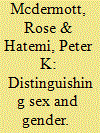|
|
|
Sort Order |
|
|
|
Items / Page
|
|
|
|
|
|
|
| Srl | Item |
| 1 |
ID:
102074


|
|
|
| 2 |
ID:
175306


|
|
|
|
|
| Summary/Abstract |
Claims of misconduct must be accompanied by verifiable proof. In “Diagnosis versus Ideological Diversity,” Phillip W. Gray (2019) professes the need to address bias and dishonesty in research but contradicts his stated goals by making untrue and unsupported allegations of misconduct. He equates a coding error with LaCour and Green’s (2014) suspected data fabrication while disregarding publicly available contradictory evidence. In this evidence-based article, we demonstrate that Gray made a series of false accusations of research dishonesty and ideological bias. His assertions not only are unsupported; the evidence also shows the opposite. PS: Political Science & Politics edited Gray’s article after publication and online distribution—removing or modifying the most explicitly false and harmful statements—and changed his central thesis but without changing the DOI. This resulted in two different articles with the same DOI. Although retraction is uncommon, this degree of post-publication modification appears to meet the threshold. The published corrigendum failed to address Gray’s false allegations, pervasive and unsubstantiated insinuations of misconduct, and errors that persist in the second edition of his article. The constellation of behaviors by the journal and Gray contradicts academic norms and emphasizes the need to establish clear standards of evidence when making accusations of academic misconduct.
|
|
|
|
|
|
|
|
|
|
|
|
|
|
|
|
| 3 |
ID:
111920


|
|
|
|
|
| Publication |
2012.
|
| Summary/Abstract |
A great deal of foreign policy analysis relies on social and environmental factors, or anecdotal evidence. In seeking to address this problem in a more systematic manner, we move from an investigation centered around state actors to one focused on variation in individual behavior account for the combination of social, cultural, environmental, psychological, and biological differences. Our proposed approach to the study of political violence requires the integration of methods and skills from geneticists and neuroscientists with those in the behavioral and social sciences. Specifically, we seek to introduce an approach to study political violence which : (i) quantifies the effects of genes, environments, and their interaction on behavior; (ii) identifies specific genetic and environmental contexts that lead to such behavior; (iii) develops a comprehensive model of the biological and social pathways to political violence; (iv) identifies populations under specific circumstances which pose a higher or lower prevalence for any specific genes, neurobiological or environmental mechanisms which pose an increased liability for political violence; (v) develops mechanisms to identify individuals within given populations who are most at risk for committing violence, as well as those most resistant to such action; and (vi) creates environmental responses which can mitigate risk among those individuals.
|
|
|
|
|
|
|
|
|
|
|
|
|
|
|
|
| 4 |
ID:
105426


|
|
|
|
|
| Publication |
2011.
|
| Summary/Abstract |
One of the concerns that has plagued research on the biological and genetic underpinnings of social behaviors and individual differences is the fear that such information can be used for ill. This fear rests on a foundation of good reason. Early abuses involving the use of selective phrenology and other purportedly "scientific" methods to establish moral hierarchies among races or between sexes have exerted profound and lasting damage on society, as well as affecting later attempts to more productively examine the biological bases of individual difference. And yet, many policies that have focused exclusively on social factors have created equal pain and suffering, although these approaches have rarely fostered as much discussion. However, despite these negative outcomes, biological research can also attack diseases, alleviate suffering, and dispel social myths that wrongfully assign blame to the victim or otherwise oversimplify behavior. Here, we argue for a similar positive valuation of such an approach in political and social research. We concentrate not on the ethics of conducting this research, but rather the ethical need for this research to be conducted.
|
|
|
|
|
|
|
|
|
|
|
|
|
|
|
|
| 5 |
ID:
134724


|
|
|
|
|
| Summary/Abstract |
Neurobiological advances appear critical for explicating individual differences in attitudes, values, behaviors, cognition and evaluation, but only recently has the neurobiological tool kit been applied to questions of interest in international relations. In this review, we first provide an overview of historical approaches from two domains of enduring interest to the field: leadership and political violence. We then explicate the ways that the neurobiological revolution has so far furthered our understanding of these domains.
|
|
|
|
|
|
|
|
|
|
|
|
|
|
|
|
|
|
|
|
|